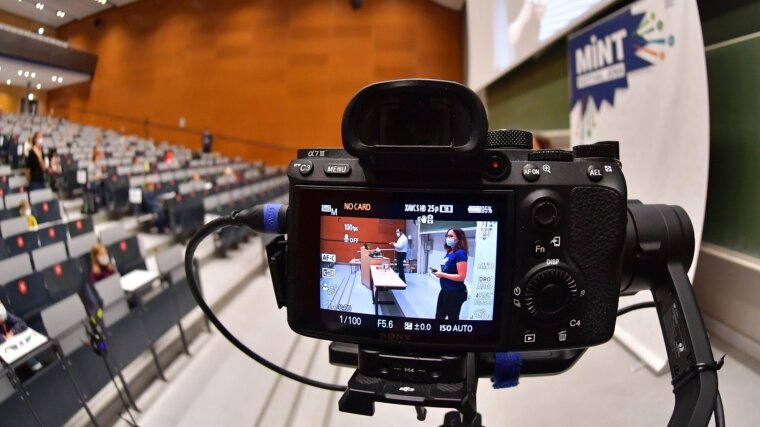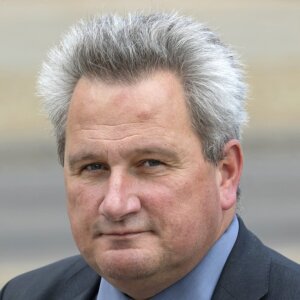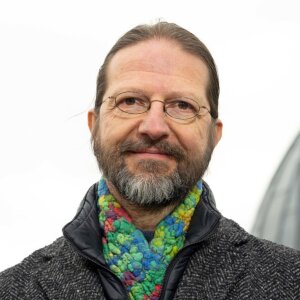
Exchanging research results has become a standard practice for today’s scientists. Discussing their work with fellow specialists ensures the quality of their own research and helps to generate new ideas. Researchers from our university report here why they also communicate their findings to the general public and how their ideas are received.
Survey: Vivien Busse
Andreas Freytag
(Professor of Economic Policy)
Professor Dr Andreas Freytag
Image: Anne Günther (University of Jena)My subject is economic policy, a branch of social science relevant for everyone and always linked to the expectation of normative conclusions. Many observers develop a clear opinion—often unchecked by facts and logic. Therefore, I frequently have to debunk myths about economists—especially when I talk to colleagues from other scientific fields! That’s where science communication plays a central role. I try to present the results of my research and other people’s work in a way the general public can understand, so that people can form their own opinion. This will only work if my arguments are based on evidence and if I avoid unnecessary jargon and defend my views without belittling others. The vehicles for this communication are columns (»Freytags-Frage«), blog posts, guest articles in daily newspapers, interviews, lectures and—very importantly—public debates. What I enjoy most is convincing sceptics of rational positions.
Jens-Christian Wagner
(Professor of history in the media and in the public sphere)
Professor Dr Jens-Christian Wagner
Image: Jens Meyer (University of Jena)There’s no science without communication. Within the scientific community it’s a basic requirement for every discourse. For the outside world, it’s the driving force behind the social, technological and political development of society. By combining my university activities with my work for the Buchenwald Memorial, I act as a liaison between science and the public. The memorial presents research results to the general public in many ways: through publications, exhibitions, group mentoring, historical-political initiatives in the public sphere, educational materials and social media. Each medium has specific requirements for the transfer of knowledge to particular target groups. The challenge is to convey content in a way that people can understand without reducing its complexity to such an extent that reflective historical awareness is replaced by one-dimensional images of history.
Annika Klafki
(Junior Professor of Public Law)
Junior Professor Dr Annika Klafki
Image: Anne Günther (University of Jena)Science communication is a small but important part of my work. Presenting my research results to the general public enables me to take part in the democratic processes of decision making. The coronavirus pandemic has created a particular demand for scientific information within society. The restrictions of fundamental rights to curb the spread of the virus raise various legal issues. Whenever I decide to make my research available to the general public, I publish my work on scientific blogs that are also read by journalists. In case of topical issues this often leads to press enquiries that allow me to reach an even broader audience. There are, however, certain pitfalls when working with journalists: Statements can be shortened or paraphrased in such a way that they become scientifically incorrect. That’s why I try to communicate particularly clearly when dealing with the press. I use short sentences and refrain from using technical terms to avoid misunderstandings.
Christoph Grützner
(Postdoc in the working group structual geology)
Postdoc Christoph Grützner
Image: Philipp BallingScience communication is an important aspect of my work. As I research major earthquakes, I’m benefited by the fact that many people are interested in my topic. Everyone knows the devastating effects of earthquakes. People often expect science to eventually solve the »earthquake problem«. In such cases, I have to explain that this expectation is wrong. We’re trying to gain a greater understanding of seismic activity, but society is responsible for implementing measures based on our findings. That’s why I back up my work with a blogExternal link and Twitter pagesExternal link (and https://twitter.com/paleoseismicityExternal link as well). I also write press releases, give interviews and talk to schoolchildren. The response is almost always positive. However, it is often difficult to explain the limits of our knowledge and uncertainties in a way that everyone can understand. That’s why we’re often accused of wasting the taxpayer’s money when we don’t know anything for sure anyway.
Mathias W. Pletz
(Professor for Infectious Diseases)
Professor Dr Mathias W. Pletz
Image: UKJThe ongoing pandemic proves that ensuring successful science communication is just as important as generating scientific results. What use are the newly developed vaccinations if they’re not accepted? What use are the findings on aerosol transmission if they’re not implemented? Over the past two years, I’ve been able and obliged to learn a lot about science communication. There’s an unresolved but crucial question in my eyes: Science thrives on »trial and error« and the permanent discourse it generates. Society is overwhelmed by this discourse and the standard scientific differentiation between an effect size and the strength of evidence—especially when far-reaching political decisions are justifi ed with reference to science. When it comes to communicating our results, the journalistic aspect is a decisive factor that determines the success and failure of science communication. That’s why I would like to see a code for scientists and journalists—similar to the one that applies to good scientific practice.
Ralph Neuhäuser
(Professor of Astrophysics)
Professor Dr Ralph Neuhäuser
Image: Jens Meyer (University of Jena)It’s easy to inspire people with public lectures on astronomy, especially when you have topics such as historical observations of supernovae or Halley’s comet and research on exoplanets or neutron stars. However, we shouldn’t just present our »nice and exciting« findings. We also have to communicate all our difficulties, our (intentional) simplifications and our uncertainties—all our restrictions and preliminary findings. This can be a sobering experience for everyone interested (e.g. when it becomes clear that not every so-called »exoplanet« fulfills the scholarly definition of a planet—let alone is a »second Earth«). The history of science, which is full of mistakes and half-truths, should encourage us to engage in an open and courageous discourse—in the community and beyond. And much of today’s common knowledge was originally a minority view.
Karl-Wilhelm Niebuhr
(Professor of Theology / New Testament)
Professor Dr Karl-Wilhelm Niebuhr
Image: Johannes U. BeckFirst of all, scientists have to communicate with one another to actually understand something about their subject—and that’s difficult enough as it is. But it’s a good way for me to convey topics and problems, including the attractiveness of my specialist subject. Every single science has become so complex that it’s often easier to communicate with people from your own discipline than with the outside world—and that’s a great danger. If we only understand ourselves, we’ve lost sight of the essentials. That’s why I consider science communication, first and foremost, to be a means of self-criticism. And then I’m sometimes surprised to sense that someone else also finds my subject interesting. Theologians arguably feel this the most when they’re preaching, but our university also promotes this feeling during specialist discussions beyond the bounds of theology. And that’s one of the »soft« factors that make it plausible for theology to be practised at the university.
Johannes Kretzschmar
(Research assistant at the Institute of Applied Physics)
Johannes Kretzschmar
Image: Anne Günther (University of Jena)If you’d asked me a few months ago, I would’ve had much more positive and enthusiastic things to say about science communication. I would’ve talked about how, apart from press releases and email newsletters, we can address recipients more intimately in formats such as science slams, pub quizzes, Twitter debates, YouTube videos and even TikTok dances—presented personally and directly by researchers who know how to inspire their audience. However, I’ve become more critical during the ongoing coronavirus pandemic due to the recent use of scientifi c knowledge. Results are being politicized far too often and scientists who dare to talk publicly are being met with hostility. This shows there is a particular lack of safe environments for science communication, especially when it comes to relevant issues and target groups.
Anja Laukötter
(Professor of cultural history)
Professor Dr Anja Laukötter
Image: Anne Günther (University of Jena)Science communication is very important to me. It’s not always easy and often takes extra effort—and doesn’t always work out as planned. Nevertheless, communicating and discussing scientific findings with the public — and promoting the general acceptance and visibility of science — are important objectives of my historical work. In recent years, I’ve tried out a variety of multimedia formats for this purpose, including public lectures, radio and newspaper interviews, panel debates, the organization of public film series with accompanying scientific lectures and the initiation of two online projects: a bilingual web portal called »History of Emotions—Insights into Research« and a blog called »Feeling News« that deals with the social impact of the COVID-19 pandemic. There is also a website for my latest monograph, where many of the films discussed in my book can be accessed. How is the response? On the whole, it could be bigger. However, I’m learning lots of new things and I’ll never stop trying!
Tobias Rothmund
(Professor of Psychologie of communication and media use)
Professor Dr Tobias Rothmund
Image: Anne Günther (University of Jena)Science communication is not a one-way street. It is not just about transmitting findings to society as effectively as possible. As scientists, communicating with the general public also teaches us something for our own research. In the social sciences, the reciprocal nature of communication is particularly evident. The quality of research depends directly on how well researchers are able to understand, bundle and structure social discourses. At the same time, research only develops its relevance in social discourse. Social media are becoming increasingly interesting for science communication. They allow scientists, policy-makers and the general public to share and discuss scientific findings. On Twitter I can point directly to a recent study or engage in a political discourse for which certain scientific findings are relevant. This form of science communication is proactive, open and tailored to the attention logic of our mediatized society. Of course there are obvious obstacles for science communication in this area: A lack of time resources, politically motivated criticism of science, and the dynamics of outrage are often in conflict with a rational discourse. Nevertheless, I assume that social media will play a central role in the future of science communication.









